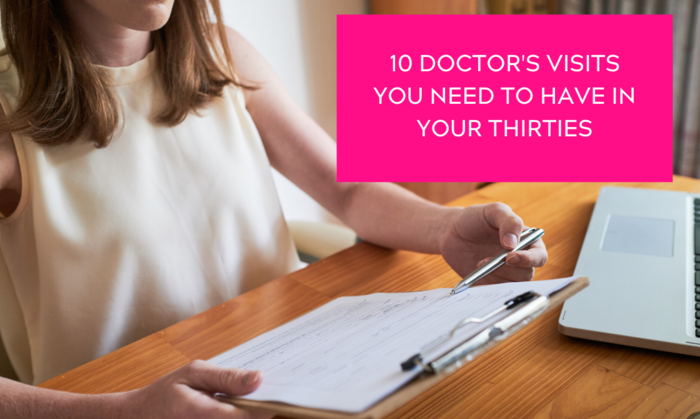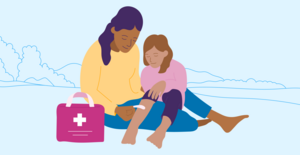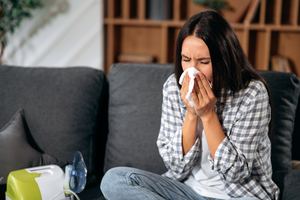Key points
- In your 30s, prioritizing preventative care is crucial to maintain health and manage healthcare costs.
- Regular visits to a primary care physician, dentist, optometrist, dermatologist, mental health professional, allergist, cardiologist, endocrinologist, fertility doctor, and radiologist are recommended.
- Regular checkups can help detect health issues early, manage existing conditions, and ensure vaccinations and screenings are up-to-date.
- Effective communication with your doctor is essential for optimal care and understanding of your health.
- The article also provides gender-specific healthcare tips for women and men in their thirties, emphasizing the importance of regular gynecological check-ups for women and fertility check-ups for men planning to have children.

Managing your healthcare can be confusing. In your twenties, you may have only gone to the doctor when you were sick (or, if you didn't have insurance, really really sick) and to get your annual check-up (if you remembered to!). Now, you’re in your thirties and starting to realize that your body needs a little more physician-guided TLC than it once did.
As you get older, being proactive about your healthcare becomes increasingly important. No matter how healthy you are, this is the time in your life when you need to start thinking about the big picture of your health — and making sure you’re getting all the essential doctor’s appointments recommended to people in their thirties. Prioritizing preventative care will help you avoid illness and injury now, and it will help you maintain your health and keep your healthcare costs down as you get older.
Below, learn how to manage your healthcare in your thirties including which doctors you should see, recommended medical tests, and questions that might be helpful to ask your doctor. Depending on your medical history or any pre-existing conditions, your doctor may suggest more frequent check-ups or tests than we outline below. Consider this a handy guide to making sure you get the healthcare you need, when you need it, but remember, this isn’t medical advice. Your care team, including your primary care doctor, any specialists you see, or providers you’re treated by at urgent care, can give you more personalized recommendations based on your health journey.
Which doctors should you see in your 30s?
To get the most comprehensive healthcare during your thirties, consider adding a few different types of physicians to your care team. Some may seem more obvious, like getting a physical exam at your primary care doctor’s office or seeing your dentist for your twice-yearly cleaning and exam. Others, however, may not have been on your radar until now. The doctors you should visit in your thirties include:
Primary care physician (PCP)
Your primary care doctor is the provider you see for common, non-urgent medical concerns. They treat you when you’re sick (unless you’re experiencing an illness or injury that’s not quite an emergency but also not able to wait until you can see your PCP — that’s where urgent care comes in.)
Dentist
The American Dental Association recommends going to the dentist at least once or twice a year for a cleaning and exam.
Optometrist
In your thirties, you should visit your eye doctor for a routine eye exam every two years, according to the American Optometric Association. If you have past vision problems or a family history of eye disease, diabetes, or high blood pressure, you may need to see the optometrist more often. Always follow their recommendation for how frequently you need your eyes checked.
Dermatologist
Though it’s a good idea to do monthly self-checks at home, the Skin Cancer Foundation recommends seeing a dermatologist once a year to help detect any potential cancer early, before it has a chance to start growing.
Mental health professional
Your twenties and thirties can be full of big life transitions, and your mental health needs to be a priority. Even if you don’t have a history of depression, anxiety, or another type of mental health condition, seeing a therapist and/or a psychiatrist may be a good idea when you’re navigating life. If you don’t have a mental health provider in mind, talk to your PCP as they may be able to make a referral.
Allergist
As if having allergies isn’t bad enough, they can get worse over time. If you feel like you’re constantly battling cold-like symptoms and the mere thought of spring makes you reach for the antihistamines, it’s probably time to see a professional.
Cardiologist
Your primary care doctor may recommend visiting a cardiologist if you are showing symptoms that could be due to a heart condition, such as shortness of breath, chest pains, or dizziness, according to the American College of Cardiology. If you have a personal or family history of heart disease, getting checked while you're young and in your thirties is a good idea that can help you prevent heart disease, instead of having to treat it in an emergency.
Endocrinologist
Endocrinologists specialize in treating hormonal conditions, such as diabetes, thyroid disease, and metabolic disorders.
Fertility doctor
Also known as a reproductive endocrinologist, a fertility doctor can discuss your family planning options with you and address any infertility concerns. If you’re undecided about having children, it’s a good idea to discuss your options with a fertility doctor.
Radiologist
If you have a family history of breast cancer, you may need to start getting mammograms before the typically-recommended age of forty. Your doctor may also refer you to a radiologist for an MRI, CT scan, or x-ray to help them diagnose an injury or illness.
Need a handy list for #allthedoctors you need to see in your 30s? We've got you covered.
How Often Should Adults Get a Checkup?
Adults should generally get a check-up at least once a year, but the frequency can vary based on age, health status, and specific risk factors. For younger adults in their 20s and 30s, a check-up every 1 to 3 years may be sufficient if they are healthy and have no chronic conditions. As individuals enter their 40s and 50s, annual check-ups become more important to monitor emerging health issues and manage preventive care. For those aged 60 and older, more frequent visits may be recommended to address age-related health concerns and ensure proper management of existing conditions. Ultimately, it's essential for adults to consult with their healthcare provider to determine the best schedule for their individual health needs.
What Are the Benefits of Regular Checkups?
Regular checkups play a crucial role in maintaining overall health and wellness. They provide an opportunity for individuals to engage with their healthcare providers, discuss any concerns, and receive guidance on preventive measures. By prioritizing regular checkups, patients can take proactive steps toward their health, ultimately leading to a better quality of life.
Here are some key benefits of regular checkups:
-
Early Detection of Health Issues: Regular checkups can help identify potentially life-threatening health conditions early, before they develop into more serious problems.
-
Timely Treatment: Early treatment of health conditions increases the chances of a positive outcome and can prevent complications.
-
Monitoring Existing Conditions: Regular visits allow for the ongoing management and monitoring of existing health issues, reducing the risk of worsening symptoms or severe complications.
-
Vaccination and Screening Updates: Checkups ensure that individuals stay up-to-date on necessary vaccinations and screening tests, which are vital for preventing disease.
-
Cost Savings: By catching health issues early, regular checkups can limit extra healthcare costs associated with treating complicated or serious conditions that may arise if left unchecked.
-
Building a Relationship with Your PCP: Regular interactions with a primary care physician foster an open and honest relationship, making it easier to discuss health concerns and receive personalized care.
-
Health Education: Checkups provide an opportunity to learn about new ways to live a healthier, longer life, empowering individuals to make informed health choices.
Talking to Your Doctor
Effective communication with your doctor is essential for receiving the best possible care. A productive dialogue allows you to express your concerns, ask questions, and understand your health better. Preparing for your appointment and being proactive in your discussions can lead to more tailored and effective healthcare solutions.
Here are some tips and questions to help you engage in meaningful conversations with your doctor:
-
Prepare a List of Questions: Before your appointment, make a list of questions and topics you want to discuss, prioritizing the most important ones to ensure they are addressed.
-
Ask for Clarification: If you don’t understand something your doctor tells you, don’t hesitate to let them know and ask for explanations in simpler terms.
-
Seek Completeness: If your doctor doesn’t fully answer your question, ask for more information to ensure you have a clear understanding.
-
Repeat Back Information: Paraphrasing what your doctor has said can help confirm your understanding and clarify any miscommunications.
-
Take Notes: Jotting down important points during your conversation can help you remember key information and instructions.
-
Inquire About Communication Preferences: Ask your doctor how they prefer to handle follow-up questions after your visit, whether through email, a patient portal, or phone calls.
-
Address Hearing Issues: If you have difficulty hearing your doctor, let them know so they can adjust their communication style.
-
Express Your Concerns: If you disagree with a recommendation or treatment plan, feel free to voice your concerns; your input is valuable in shaping your care.
-
Discuss Sensitive Topics: Remember that your doctor is bound by confidentiality and cannot share your information without your permission, which can help ease conversations about uncomfortable or embarrassing issues.
FAQs
Why is it important to prioritize preventative care in your 30s?
Prioritizing preventative care in your 30s can help you avoid illness and injury now, and maintain your health and manage your healthcare costs as you age.
Which doctors should I visit regularly in my 30s?
You should regularly visit your primary care physician, dentist, optometrist, dermatologist, mental health professional, allergist, cardiologist, endocrinologist, fertility doctor, and radiologist.
How often should I get a checkup?
Adults should generally get a check-up at least once a year, but the frequency can vary based on age, health status, and specific risk factors.
What are the benefits of regular checkups?
Regular checkups can help identify health conditions early, provide timely treatment, monitor existing conditions, ensure vaccinations and screenings are up-to-date, and build a relationship with your primary care physician.
How can I improve my communication with my doctor?
You can improve communication with your doctor by preparing a list of questions before your appointment, asking for clarification when needed, taking notes during your conversation, and expressing any concerns or disagreements.
What are the specific healthcare considerations for men in their thirties?
Men in their thirties may need to consider fertility care, such as checking testosterone levels or doing a semen analysis. However, men typically don't need to start getting prostate or colorectal cancer screenings until they reach fifty.
What is the importance of preventative care in your thirties?
Preventative care in your thirties is crucial for catching any health issues in their earliest stages. Regular check-ups can help you stay active, vibrant, and free from illness and injuries.
What are some alternatives to traditional doctor's visits if I need immediate care?
If you need immediate care but it's not an emergency, urgent care is an affordable and time-sensitive alternative to traditional doctor's visits. You can even book a same-day urgent care appointment through Solv.









